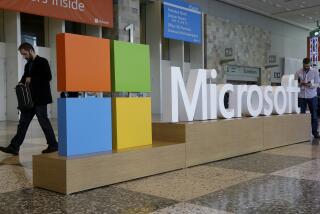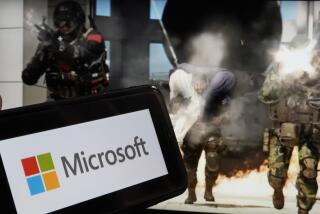THE MICROSOFT AGREEMENT : Rival Firms Look to Make Gains
- Share via
For Novell Inc., Lotus Development Corp., Borland International and many small computer software companies that have complained long and loud about Microsoft Corp., Saturday’s announcement of a settlement in the government’s antitrust case against the industry leader is at least a moral victory.
But the agreement stops far short of the sweeping measures--such as outright breakup of the company--that some people had hoped to see. And it also is unlikely to alter substantially the balance of power in the computer industry--at least for the moment.
Microsoft has agreed to end three of the allegedly monopolistic practices that infuriated its competitors the most. And that was good enough for Novell, which offers a version of DOS (disk operating system) in competition with Microsoft. Novell also makes the Word Perfect word processing program and popular computer networking software.
Microsoft agreed to change its volume licensing of the MS-DOS and Windows operating systems, which had the effect of locking out competitors. It will also stop requiring other software firms to sign highly restrictive confidentiality agreements. And it will stop using certain long-term licensing contracts.
“Clearly, we see this as a victory,” said David Bradford, general counsel for Novell, the chief rival of Microsoft. “This has been a long effort by many companies for many years, and this decision today will provide consumers with increased choices and more innovative products.”
In principle, the settlement will benefit consumers by assuring robust competition in the software business, which in turn will assure interesting and high-quality products. Many software companies, even large ones such as Novell and Lotus, which makes the popular 1-2-3 spreadsheet program, have been struggling to sustain market share in the face of relentless pressure from Microsoft.
And for smaller firms, many of whom are dependent upon one innovative product, Microsoft can be a terrifying specter. Companies such as Intuit, which makes Quicken personal finance programs, and Broderbund Software, known for its Where in the World Is Carmen Sandiego? educational program, have watched while Microsoft invested tens of millions of dollars in trying to displace them from their niches.
And investors have been reluctant to fund some start-up software companies out of fear that their original ideas could quickly be mimicked by Microsoft, which is rapidly expanding its product line to include everything from word processors to games. The settlement, however, will likely do little to inhibit Microsoft’s competitive posture outside of the operating system area.
Consumers could benefit if true competition develops in the market for DOS, the software that controls basic computer functions. The agreement requires Microsoft to change the way it licenses MS-DOS and Windows, thus opening the way for competing products, notably DR-DOS from Novell.
That provision could be even more important for the next generation of more high-powered operating systems, where Microsoft’s dominance is not so clearly established. IBM, with its OS/2 program, as well as Novell with its Unix system, and eventually Apple and IBM with Taligent, hope to prevail over Microsoft in that coming battle.
“We still have to assess what the implications will be for OS/2, but if this opens up more choices for consumers, we are very pleased,” said IBM spokesman John Iwata.






